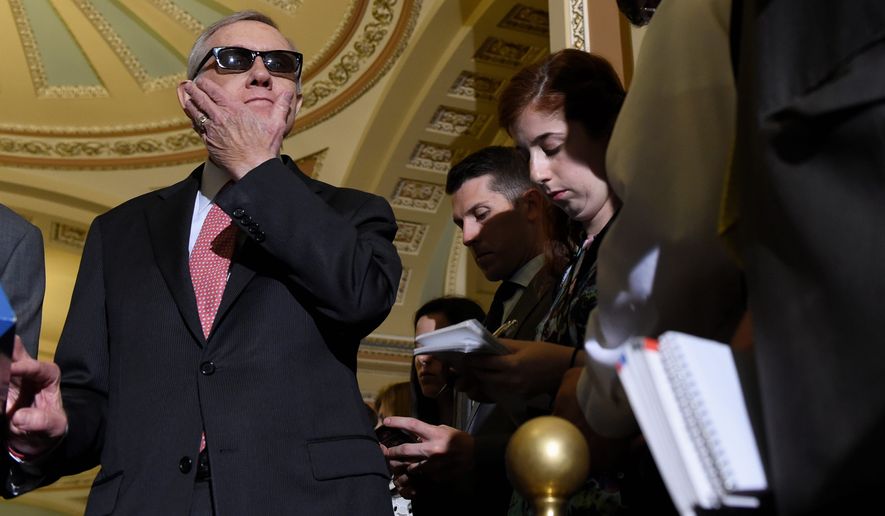Senate Democrats filibustered the annual defense spending bill Thursday, marking the beginning of shutdown summer — a monthslong battle between Republicans who want to increase government spending by some $40 billion next year and Democrats who say at least twice that is needed.
It’s a major reversal from the recent past, when shutdown showdowns were precipitated by fights over how deeply to cut.
This year, fed up with the depth of defense spending cuts they have had to endure and finally able to do something about it with control of both chambers of Congress, Republican leaders have gone the other direction, proposing a major boost for the Pentagon.
Democrats, meanwhile, insist on increased funding elsewhere as well — education, health and environmental programs included — or they will refuse more money across the board, including for troops. Their filibuster Thursday was the first step toward enforcing that demand.
“We’ve been very clear — very clear — the federal budget must be balanced between defense and domestic spending. That’s what’s fair. That’s what the American people deserve,” Senate Minority Leader Harry Reid, Nevada Democrat, said in defending the move. “The Republicans know our position. They’re choosing just to ignore it.”
The stalemate has left both sides preparing for a drawn-out fight with more blame than compromise before the next fiscal year starts Oct. 1.
Without an agreement before that date, options are limited. Congress could agree to a stopgap measure, known in Capitol-speak as a continuing resolution; keep current spending levels intact into the next fiscal year; or reach a stalemate, sending the government into a partial shutdown.
Democrats were unified Thursday with the entire Senate caucus voting to block the Pentagon’s funding. Just minutes earlier, many of the same Democrats voted for the annual defense policy bill — a separate measure from the defense spending bill, though the two overlap greatly. The policy bill lays out priorities such as pay raises for troops, and the spending bill appropriates the money to carry it out.
Republicans said they were stunned that Democrats could vote for one and not the other.
“It would be very cruel indeed for any senator who just made that promise to turn around now and block the rest of us from fulfilling their pledge to the troops,” said Majority Leader Mitch McConnell, Kentucky Republican.
The problem, as it has been for the past few years, is the “sequester” budget cuts under a 2011 agreement by both parties in Congress and President Obama. In exchange, the president was granted power to accumulate $2 trillion more in federal debt.
The sequester included cuts so deep to defense and domestic spending that, in theory, it would force Democrats and Republicans to come up with a more reasonable replacement. But the deficit supercommittee failed to reach an agreement on a replacement, leaving the automatic cuts in place and trimming agency budgets governmentwide.
The cuts proved to be effective in reducing the deficit and became popular among many Republican voters and officeholders alike.
But defense hawks argued that the military budget was stretched too thin. Once Republicans gained control of both chambers of Congress, the hawks insisted on using a war funds gimmick to increase Pentagon spending by about $40 billion next year.
That money technically doesn’t count against the sequester, so Republicans argue that it is sticking to the deal while Democrats are reneging.
Democrats say the gimmick makes a mockery of the sequester deal and that domestic spending should be increased if the defense budget gets a boost.
Mr. Obama has vowed to veto every single spending bill coming out of Congress, including the defense spending bill, until Republicans cave.
“The president has been clear that he is not willing to lock in sequestration going forward, nor will he accept fixes to defense without also fixing non-defense,” the White House budget office said in its official policy statement to Congress.
Democrats are counting on Republicans taking the blame if the government shuts down again, saying domestic priorities such as health care, education and infrastructure are suffering under Republican control of Congress.
Indeed, Republicans took political heat during the 2013 shutdown, which they orchestrated to protest continued Obamacare funding. The political damage was muted by the disastrous rollout of health care exchanges, which quickly put the president on the defensive and shifted the focus away from Republicans.
Republicans say things are different this time and believe they can portray Democrats as the minority obstructionists and deal-breakers.
The Senate Republicans’ campaign arm was ramping up attacks Thursday afternoon, calling senators who supported the filibuster “shameful.”
• Stephen Dinan can be reached at sdinan@washingtontimes.com.




Please read our comment policy before commenting.